In an era where global health security transcends borders, World Bio Summit 2023 in Korea commenced its two-day meeting on Monday with the goal of bolstering global pandemic response capabilities.
Hosted by the Ministry of Health and Welfare (MOHW) and the World Health Organization (WHO), the summit is a unifying platform for international society, businesses, governments, and international organizations to prepare for future infectious diseases.
It involves discussions on fostering specialized personnel for production, regulatory innovation, and options for financial support. Additionally, the event plans to thoroughly review concrete strategies for regional and continental cooperation models in vaccine production and development that have been gaining prominence in the vaccine field.
Notably, the MOHW expects that it will elevate Korea's status as a leading nation in global discussions on preparing for future infectious diseases.
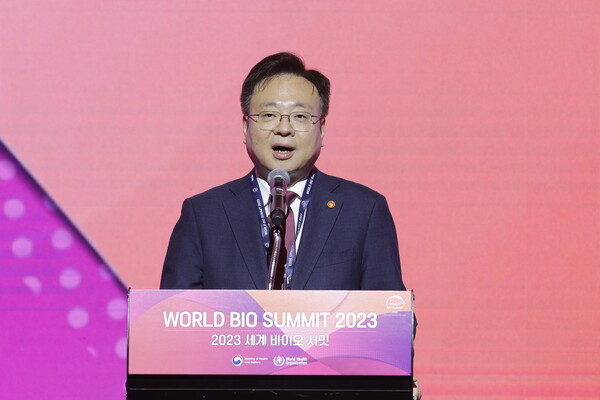
"Over the past three years, humanity has faced unprecedented health emergencies due to the Covid-19 pandemic," MOHW Minister Cho Kyoo-hong said during his opening remark. "During the pandemic, the whole world has focused on strengthening capabilities for vaccine development and supply."
Collaborative efforts and global solidarity went beyond borders, and thanks to international cooperation and efforts, the global community was able to overcome the perils brought about by the pandemic, Cho said.
During that time, Cho stressed that Korea has taken a leading role in realizing global health security.
"However, it is crucial to acknowledge that Covid-19 is not totally over and that we still face the potential of other infectious diseases," Cho said. "Therefore, we need to focus our attention on preparing for the next pandemic."
Cho stressed that if the global community shares its experiences, he believes that it will be of great help in combating future challenges.
"With this understanding, Korea and WHO have convened the World Bio Summit 2023, building on the success of last year," he said.
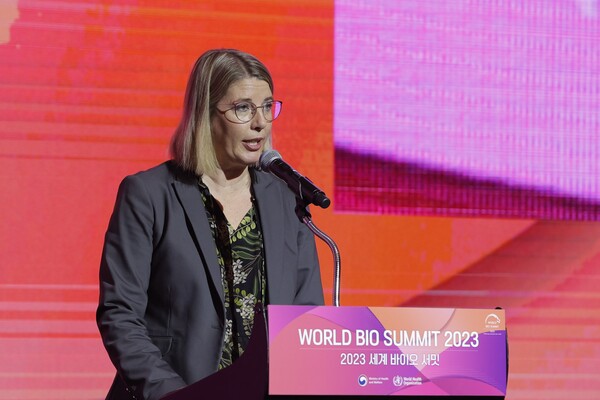
During the keynote speech, Catharina Boehme, WHO's Assistant Director-General, External Relations and Governance, gave guidelines on how the global community can prepare for the next pandemic.
"Despite the hardship brought by Covid-19, we also witnessed presidential scientific progress," Boehme said. "The development of vaccines, therapeutics, and tests in record time is a clear proof of that."
However, the inequitable access to these lifesaving tools resulted in immense suffering for families and communities, she added.
Boehme stressed that these inequities are still present, and the WHO is determined to address these concerns so that the global community can walk towards a healthier, safer, fairer world.
According to Boehme, three key areas that demand attention are building robust governance and global cooperation, developing regional hubs for vaccines and biomanufacturing, and setting up a collaborative network for global health security based on the lessons learned from Covid-19.
"Korea has a big role to play when it comes to regional production, but also more broadly when it comes to achieving the sustainable development goal for health," Boehme said. "Korean companies and partners are famous for their agility in innovation, attention to quality, and affordability."
Boehme stressed that she personally witnessed this, and it was one of the reasons that the WHO has established the first global training hub for biomanufacturing in Korea.
"There is a role for all of us in this forum in a world full of challenges and despair due to climate changes and record numbers of forcibly displaced people increase the risk of pandemics," she said. "WHO sees hope because there are partners here in Korea and around the globe focusing on pandemic prevention, preparedness and response."
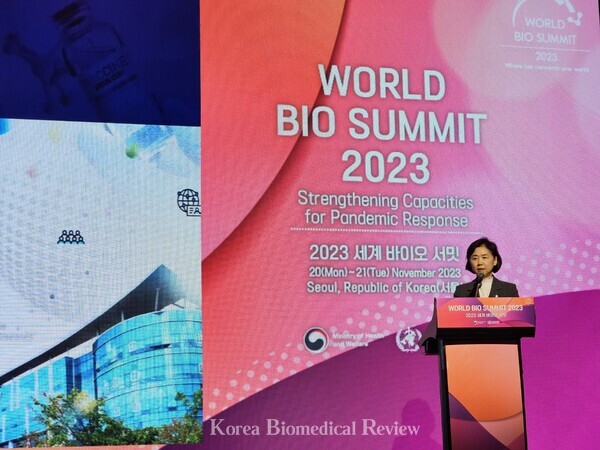
Korea Disease Control and Prevention Agency (KDCA) Commissioner Jee Young-mee also explained Korea's comprehensive R&D strategies and response to emerging infectious diseases.
"In addressing emerging infectious diseases, Korea has mobilized a robust R&D strategy, epitomized by the agile establishment of the KDCA and National Public Health Center," Jee said. "Our nation's response to Covid-19, characterized by swift testing, transparent communication, and public participation, has been integral."
Jee stressed that Korea has since scaled up health and medical research, leading to significant advancements such as the development of vaccines and therapeutics within an impressively short timeframe.
"Our commitment extends globally, with partnerships like the recent one with the African CDC, aiming for equitable healthcare access," she said. "As we advance, our national pandemic preparedness and response plan, with its multi-sectoral approach, set a precedent for rapid medical countermeasure development and enduring global health security."
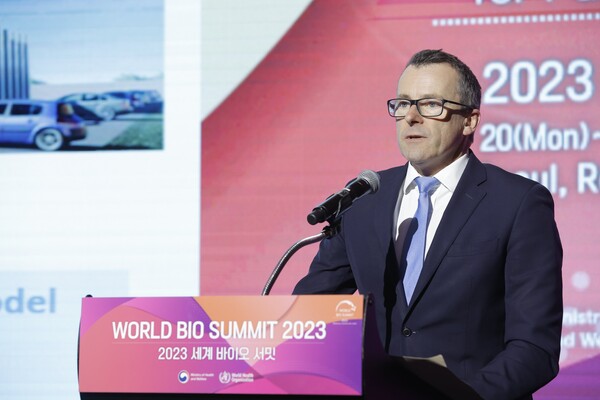
The keynote session was also joined by Ireland's National Institute for Bioprocessing Research and Training (NIBRT) CEO Darrin Morrissey, who explained his organization and trends and challenges in biopharma manufacturing.
"In the rapidly evolving landscape of biopharmaceutical manufacturing, we face the challenge of keeping pace with fast change, amplified by the Covid-19 pandemic," Morrissey said. "There is an acceleration of growth in the number and diversity of novel therapies, creating a perfect storm for manufacturing models."
Scaling up the manufacture of complex therapies like mRNA vaccines is still inefficient and requires innovative solutions, he added.
Morrissey stressed that the biopharma industry struggles to harness digital and AI advances due to regulatory complexities, and sustainability remains a pressing challenge amidst global conflicts and supply chain uncertainties.
Morrissey further emphasized, "Critical challenges that resonate with today's theme include the availability of specialized talent and the variation in quality and quantity of manufacturing capacity."
The biopharma industry's resilience is being tested, particularly in R&D ecosystems and workforce accessibility, he added.
The NIBRT CEO said that his agency is addressing these challenges head-on by expanding its training services globally and fostering international partnerships.
"However, this is not just an Irish problem and is a global one, necessitating a concerted effort to develop regionally based training centers and manufacturing capacity in low- and middle-income countries," he said. "In 2022, we provided 31,000 training days to nearly 5,000 individuals, demonstrating our deep partnerships across academia and industry."
NIBRT's global partner program, including its partnership with Yonsei University in Korea, exemplifies its commitment to addressing the biopharma industry's pressing challenges, such as the talent shortage and regional disparities in manufacturing capacity, he added.
First session focuses on strengthening capacities for pandemic response
The first session of World Bio Summit 2023 set the stage for vaccine, pharmaceutical, and diagnostic manufacturing support to low- or middle-income countries in preparation for pandemics and response.
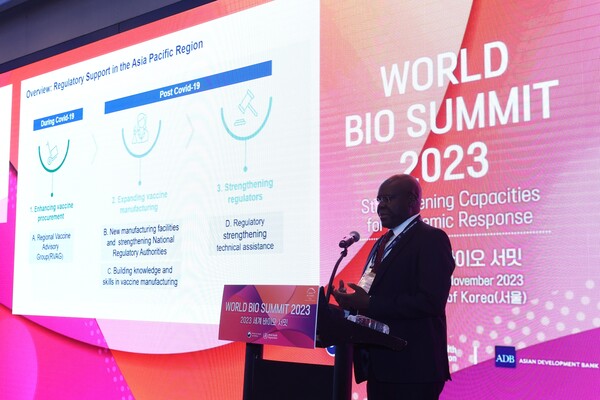
"Regulation is critical in vaccine manufacturing and innovation, and it's an area that has been historically under-invested," said Patrick Osewe, Director of the Health, Human, and Social Development Sector Office at the Asian Development Bank (ADB). "During Covid-19, we faced dual challenges -- rapid vaccine development and delivery, and the quick evolution of the virus, which put enormous pressure on countries' regulatory systems."
To address this, ADB formed a regional vaccine advisory group to advise on emerging evidence, promote information exchange, and foster regional collaboration, Osewe added.
Osewe stressed that the goal was to support countries embarking on vaccine manufacturing, which is complex and necessitates substantial capacity building, technical assistance, and technology transfer.
Focusing on Bangladesh's initiative as an example, Osewe explained that "The country is gearing up for vaccine manufacturing to ensure cost-effectiveness post-GAVI subsidy loss."
This involves constructing facilities starting with "fill and finish" and progressing to substance manufacturing, alongside upgrading the regulator's maturity level, he added.
Osewe stressed by 2029, Bangladesh aims to not only meet its national immunization needs but also to export vaccines."
Highlighting the importance of innovation and sustainability, Osewe points out, "The company we're working with is adopting green building designs, energy-efficient equipment, and sustainable manufacturing practices, which are crucial for the future."
Capacity building is paramount, and the severe shortage of talent needs addressing. Establishing networks for support and collaboration among regulators and providing resources for training across all levels are essential steps forward, he added.
The session also provided cases on regulation capacity building.
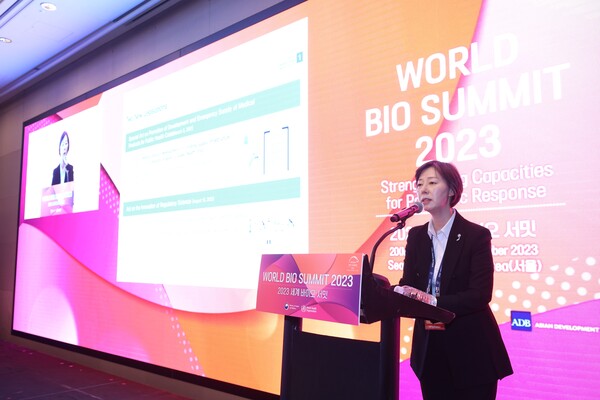
Notably, Park Youn-joo, Director General of National Institute of Food and Drug Safety Evaluation, showcased changes in Korea's regulatory setting.
"During Covid-19, Korea established two crucial laws to address unmet regulatory needs – the Special Act on Promotion of Development and Emergency Supply of Medical Products for Public Health Crisis and Act on the Innovation of Regulatory Science," Park said. "These legislative advancements enabled us to swiftly respond to Covid-19, facilitating rapid product reviews and international collaboration, and our proactive measures have positioned South Korea as a nation equipped with domestically developed vaccines and treatments, Celltrion's Regkirona and SK bioscience's SKYCovione."
Park also stressed that the MFDS implemented the Productization Strategy Support Group to oversee the journey from early drug development to market release and set up a new global export strategy officer position with the aim to elevate domestic products to international standards, fostering global competitiveness."
"Notably, Our Global Innovative Products on Fast Track (GIFT) program signifies our commitment to fast-tracking global innovative products, ensuring they reach those in need promptly," Park said. "Moreover, our vaccine completion project and collaboration with universities demonstrate our dedication to enhancing domestic vaccine capabilities and nurturing the next generation of regulatory science talent."
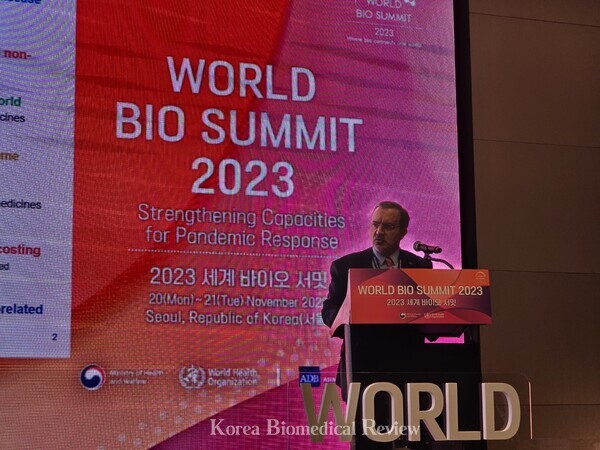
WHO's Director of Regulation and Prequalification Rogerio Gaspar talked about global challenges in the path to one health.
"Such challenges include deteriorating environment and increasing risk for disease outbreaks and emergencies, aging population susceptible to communicable and non-communicable diseases, more than half of the national regulatory authorities worldwide have inadequate regulatory systems for vaccines and medicine, limited quality-assured manufacturing capacity in some regions," Gaspar said. "It's important to ensure that quality essential medicines and health products are available in sufficient quantities and affordable to the population through functioning regulatory and procurement systems."
He explained the role of WHO's global benchmarking tool (GBT) for capacity building in regulatory systems, emphasizing that it is not for procurement or performance assessment but for building capacity since its implementation in 2016.
Gaspar also mentioned the progress with over 95 countries assessed, some through self-assessment and others formally by WHO, leading to the development of Institutional Development Plans.
Reliance and cooperation between regulatory agencies were pointed out as crucial for building a global regulatory system, as demonstrated during the Covid-19 pandemic.
"We are aiming for a global system where not every country needs to reach a maturity level three, which confirms that a country has a well-functioning and integrated regulatory system in place, individually but can achieve it through regional cooperation and mutual recognition agreements," Gaspar said. "There is a need to continue the momentum gained during the Covid-19 response to strengthen and harmonize regulatory systems globally."
More sessions to prepare the globe for future pandemics will follow Tuesday
Meanwhile, during the second day of the summit on Tuesday, global experts will gather to hold various other sessions focused on therapeutics, diagnostic devices, and vaccines.
The therapeutics session will focus on promoting the development and production of therapeutics for future pandemic response.
The Korea Disease Control and Prevention Agency (KDCA) will share global strategies for therapeutic development.
In the diagnostic devices session, FIND will discuss promoting development and production in the diagnostic devices sector, the future trends in the diagnostics market, strengthening future diagnostic capabilities, and Korea's collaboration strategies to enhance diagnostic accessibility in developing countries.
The vaccine session introduces Coalition for Epidemic Preparedness Innovations (CEPI) 's 100-day mission to strengthen global preparedness, which focuses on collaborations between the International Vaccine Institute (IVI) and CEPI.
During the event, various side events such as luncheons, seminars, and business meetings take place to support the expansion of cooperation between international organizations, global companies, foreign health ministries, and domestic biotech companies.
Related articles
- Korea honors partners for 'Global Training Hub for Biomanufacturing' at WBS 2023
- World Bio Summit 2023 takes a deep dive into preparing for the next pandemic
- World Bio Summit 2023 concludes with a global call to action for health security
- Korea's regulatory excellence propels vaccine makers to international heights

